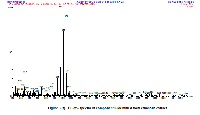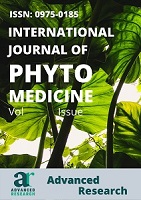Identification of an antibacterial Withanolide (Dinoxin B) from leaf of Datura inoxia Mill.
Keywords:
Datura inoxia, antibacterial compound, column chromatography, LC-ESI-MS, WithanolideAbstract
Natural medicines are gaining popularity due to the alarming incidence of bacterial resistance even in regions with improved healthcare systems. Hence, there is a distinct and constant need for isolating medicinally active compounds from different natural sources. Taking this into consideration, experiment was done in order to isolate and identify an antibacterial compound from Datura inoxia through bioassay and Mass spectroscopy technique. The ethanol, hexane and aqueous leaf extracts of Datura inoxia were screened for
References
. Akinyemi KO, Oladapo O, Okwara CE,
Ibe C, Fasure KA. Screening of crude
extracts of six medicinal plants used in
South-West Nigeria unorthodox
medicine for antimethicilin resistantStaphylococcus aureus activity. BMC
Compl Alt Med. 2005; 5: 5-8.
. Mahady GB. Global harmonization of
herbal health claims. J Nutr. 2001; 131:
S-3S.
. Austan DJ, Kristinsson KG, Anderson
RM. The relationship between the
volume of antimicrobial consumption in
human communities and the frequency
of resistance. Tro J Phar R. 1999; 3(2):
‐228.
. Bachi BB. Resistance mechanisms of
Gram positive bacteria. J Med Microb.
; 292: 27-35.
. Nagi AAH, Mashan NI, Shamsudin MN,
Mohamad H, Vairappan CS.
Antibacterial activity of marine source
extracts against multidrug resistance
organisms. Am J Pharm Toxicol. 2010;
: 95-102.
. Paul C, Arnold JV, Dirk VB, Louis M.
Anti-infective potential of natural
products: How to develop a stronger in
vitro ‘proof-of-concept’. J
Ethnopharmacol. 2006; 106: 290-302.
. Abutbul S, Golan-Goldhirsh A, Barazani
O, Ofir R, Zilberg D. Screening of desert
plants for use against bacterial
pathogens in fish. Isr J Aquacult
Bamidgeh. 2005; 57: 71-80.
. Finch R, Hunter PA. Antibiotic
resistance‐action to promote new
technologies. J Antimicrob Chemother.
, 58(suppl 1): 3‐22.
. Ariyo AO. Antimicrobial activity of the
indigenous liverwort, Riccia nigerica
Jones, from Southwestern Nigeria.
Evansia. 2011; 28(2): 43‐48.
. Gerald B. Biologically active
compounds from marine organisms.
Phytother Res. 2001; 15: 89-94.
. Houghton PJ. Old yet newpharmaceuticals from plants. J Chem
Educ. 2001; 78: 175.
. Duke JA, Ayensu ES. Medicinal plants
of China. Houghton Mifflin China. 1985:
– 91.
. Ali M, Shuab M. Characterization of the
chemical constituents of Datura metel
Linn. Ind J Pharm Sci. 1996; 5(6): 243 -
. Dabur R, Ali M, Sigh H, Gupta J,
Sharma G. A novel antifungal pyrole
derivative from Datura metel.
Pharmazie CODEN Pharlet. 2004; 59:
- 570.
. Chopra RN, Nayar SL, Chopra LC.
Glossary in Indian medicinal plants.
Council of Scientific and Industrial
Research: New Delhi; 1968. p. 121-
. Chopra RN, Nayar SL, Chopra LC.
Glossary of Indian medicinal plants.
Council of Scientific and Industrial
Research: New Dehli; 1986. p. 238 -
. Preissel U, Preissel HG. Brugmansia
and Datura: Angel's Trumpets and
Thorn Apples. Buffalo, NY: Firefly
Books; 2002. p. 106-129.
. Mathur P, Singh A, Srivastava V, Singh
D, Mishra Y. Antimicrobial activity of
indigenous wildly growing plants:
Potential source of green antibiotics. Afr
J Microbiol Res. 2013; 7(29): 3807-
. Jamdhade M, Survase S, Kare M,
Bhuktar A. Antibacterial activity of genus
Datura L. in Marathwada. Maharashtra
J phytol. 2010; 2(12): 42-45.
. Bharathi B, Sharmila devi R, Daniel G.
Studies on antibacterial activity and
phytochemical analysis of Datura metel
L against bacterial pathogens
associated with HIV. J Advanced
Biotech. 2010; 10(3): 21-25.
. Sakthi S, Saranraj P, Geetha M.
Antibacterial evaluation and
phytochemical screening of Datura
metel leaf extracts against bacterial
pathogens. Int J Pharm Biol. 2011; 2(4):
-1136.
. Tandon C, Mathur P, Sen M.
Antibacterial compounds in different
species of Datura: A review. 2014;
(21): 2090-2098.
. Okwu D, Igara E. Isolation,
characterization and antibacterial
activity of alkaloid from Datura metel
Linn leaves. Afr J Pharm Pharmacol.
; 3(5): 277-281.
. Okwu D, Igara E. Isolation,
characterization and antibacterial
activity screening of a new ß-carboline
alkaloid from Datura metel Linn. Der
Chemica Sinica. 2011; 2(2): 261-267.
. Sule A, Ahmed QU, Samah OA, Omar
MN, Hassan N, Kamal L, Yarmo M.
Bioassay guided isolation of
antibacterial compounds from
Andrographis paniculata. Am J Applied
Sci. 2011; 8(6): 525-534.
. Sen M. Authored chapter in the Manual
entitled “Vancomycin Resistant
Enterococci” of CME/Workshop on
update in Clinical Microbiology theme-“
Emerging antimicrobial resistance: Are
we doing enough?” conducted by
Department of Microbiology, Sanjay
Gandhi Post Graduate Institute of
Medical Sciences, Lucknow in
November 2006.
. Perez C, Paul M, Bazerque P. Antibiotic
assay by well diffusion method. Acta
Biol Med Expt. 1990; 15: 113-115.
. Carson CF, Hammer KA, Riley TV.
Broth micro-dilution method for
determination of susceptibility of
Escherichia coli and Staphylococcus
aureus to the essential oil of Malaleuca
alterifolia (Tea tree oil). Microbios. 1995;
: 181–185.
. Kataky A, Handique PJ. Antimicrobial
activity and phytochemical estimation of
micropropagated Andrographis
paniculata (Burm.f) NEES. Asian
Journal of Science and Technology.
; 5: 91-94.
. Mims and Playfair. Medical
microbiology. Mosby Europe. 1993; 35:
. Irkin R, Korukluoglu M. Control of
Aspergillus niger with garlic, onion and
leek extracts. Afr J Biotechnol. 2007; 6:
–387.
. Gatsing D, Nkeugoauapi CFN, Nkah
BFN, Kuiate JR, Tchouanguep FM.
Antibacterial activity, bioavailability and
acute toxicity evaluation of the leaf
extract of Alchornea cordifolia
(Euphorbiaceae). Int. J. Pharmacol.
; 6: 173–182.
. Hosamani PA, Lakshman HC, Sandeep
KK, Hosamani RC. Antimicrobial activity
of leaf extract of Andrographis
paniculata wall. Science Research
Reporter. 2011; 1(2): 92-95
. Eloff JN. Which extractant should be
used for the screening and isolation of
antimicrobial components from plants?
J. Ethnopharmacol. 1998; 60: 1–8.
. Paz EA, Cerdeiras MP, Fernandez J,
Ferreira F, Moyna P. Screening of
Uruguayan medicinal plants for
antimicrobial activity. J
Ethnopharmacol. 1995; 45(1): 67-70.
. Kudi AC, Umoh JU, Eduvie LO, Gefu J.
Screening of some Nigerian medicinal
plants for antibacterial activity. J
Ethnopharmacol. 1999; 67(2): 225-228.
. Palombo EA, Semple SJ. Antibacterial
activity of traditional Australian
medicinal plants. J. Ethnopharmacol.
; 77(2-3): 151-157.
. Karaman I, Sahin F, Gulluce M, Ogutcu
H, Sngul M, Adiguzel A. Antimicrobial
activity of aqueous and methanol
extracts of Juniperus oxycedrus L. J
Ethnopharmacol. 2003; 85(2-3): 231–
. Nikaido H. Molecular basis of bacterial
outer membrane permeability revisited.
Microb Mol Bio Rev. 2003; 67: 593-656.
. Tortora GJ, Funke BR, Case CL.
Microbiology: An Introduction. 7th ed.
Benjamin Cummings Publishing: San
Francisco, USA; 2001. p. 88.
. Gurinder JK, Daljit SA. Antibacterial and
phytochemical screening of Anethum
graveolens, Foeniculum vulgare and
Trachyspermum ammi. BMC
Complement Altern Med. 2009; 9: 30.
. Stavri M, Piddock LVJ, Gibbons S.
Bacterial efflux pump inhibitors from
natural sources. J Antimicrobial Chemo.
; 59(6): 1247-1260.
. Doughari JH, Manzara S. In vitro
antibacterial activity of crude leaf
extracts of Mangifera indica Linn. Afr J
Microbiol Res. 2008; 2: 67-72.
. Vermillion K, Holguin OF, Berhow MA,
Richins RD, Redhouse T, O’Connell
MA, Posakony J, Mahajan SS, Kelly
SM, Simon JA. Dinoxin B, a Withanolide
from Datura inoxia leaves with specific
cytotoxic activities. J Nat Prod. 2011;
(2): 267–271.
. Abraham A, Kirson I, Lavie D, Glotter E.
The Withanolides of Withania somnifera
chemotypes I and II.
Phytochemistry.1975; 14: 189–194.
. Manickam M, Srivastava A, Ray A.
Withanolides from the flowers of Datura
fastuosa. Phytochemistry .1998; 47:
–1429.
. Evans WC. In Solanaceae Biology and
Systematics: D’Arcy WG, editor.
Columbia University Press: New York;
p. 179-186.
. Veleiro AS, Cirigliano AM, Oberti JC,
Burton G. 7-Hydroxywithanolides from
Datura ferox. J Nat Prod. 1999;
:1010–2.
. Siddiqui BS, Afreen S, Begum S. Two
New Withanolides from the aerial parts
of Datura inoxia. Aust J Chem.1999; 52:
–907.
. Siddiqui BS, Afreen S, Begum S, Sattar
F. Daturacin, a new withanolide from
Datura inoxia. Nat Prod Res.2005; 19:
–623.
. Gupta M, Bagchi A, Ray AB. Additional
Withanolides of Datura metel. J Nat
Prod. 1991; 54: 599–602.
. Pan Y, Wang X, Hu X. Cytotoxic
Withanolides from the flowers of Datura
metel. J Nat Prod. 2007; 70: 1127–
. Kagale S, Marimuthu T, Thayumanavan
B, Nandakumar R, Samiyappan R.
Induction of systemic resistance in rice
by leaf extracts of Zizyphus jujuba and
Ipomoea carnea against Rhizoctonia
solani. Plant Signal Behav. 2011; 6(7):
–923.



